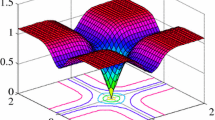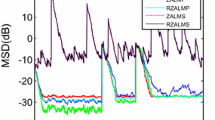Abstract
The recursive-least-squares (RLS) algorithm is one of the most representative adaptive filtering algorithms. \(\ell _1\)-norm full-recursive RLS has also been successfully applied to various sparsity-related areas. However, computing the autocorrelation matrix inverse in the \(\ell _1\)-norm full-recursive RLS generates numerical instability that results in divergence. In addition, the regularization coefficient calculation for \(\ell _1\)-norm often requires actual channel information or relies on empirical methods. The iterative Wiener filter (IWF) has a similar performance to the RLS algorithm and does not require the inverse of the autocorrelation matrix. Therefore, IWF can be used as a numerically stable RLS. This paper proposes \(\ell _1\)-norm IWF for sparse channel estimation using the IWF and \(\ell _1\)-norm. The algorithm proposed in this paper includes a realistic regularization coefficient calculation that does not require actual channel information. The simulation shows that the sparse channel estimation performance of the proposed algorithm is similar to the conventional \(\ell _1\)-norm full-recursive RLS using real channel information as well as being superior in terms of numerical stability.


Similar content being viewed by others
References
M.S. Ahmad, O. Kukrer, A. Hocanin, Recursive inverse adaptive filtering algorithm. Digital Signal Process. 21(4), 491–496 (2011)
J.W. Choi, T.J. Riedl, K. Kim, A.C. Singer, J.C. Preisig, Adaptive linear turbo equalization over doubly selective channels. IEEE J. Ocean. Eng. 36(4), 473–489 (2011)
B. Das, M. Chakraborty, Improved \(l_{0}\)-RLS adaptive filter algorithms. Electron. Lett. 53(25), 1650–1651 (2017)
E.M. Eksioglu, A.K. Tanc, RLS algorithm with convex regularization. IEEE Signal Process. Lett. 18(8), 470–473 (2011)
S. Haykin, Adaptive Filter Theory 5th (Prentice Hall, Upper Saddle River, USA, 2014)
S. Khalid, S. Abrar, Blind adaptive algorithm for sparse channel equalization using projections onto lp-ball. Electron. Lett. 51(18), 1422–1424 (2015)
J. Lim, S. Lee, Regularization factor selection method for \(l_{1}\)-regularized RLS and its modification against uncertainty in the regularization factor. Appl. Sci. 9(1), 1–11 (2019)
L. Liu, Y. Zhang, D. Sun, VFF \(l_{1}\)-norm penalised WL-RLS algorithm using DCD iterations for underwater acoustic communication. IET Commun. 11(5), 615–621 (2017)
O.O. Oyeyemi, Reweighted \(l_{1}\)-vff modified RLS-based channel estimator for OFDM-IDMA systems. In: Proceedings of IEEE 89th Vehicular Technology Conference 2019 (2019), pp. 1–7
J. Rudander, T. Husøy, P. Orten, P. Walree, Comparing RLS and LMS adaptive equalizers for large hydrophone arrays in underwater acoustic communication channels. Proc. OCEANS 2019, 1–5 (2019)
M.S. Salman, O. Kukrer, A. Hocanin, Recursive inverse algorithm: mean-square-error analysis. Digital Signal Process. 66, 10–17 (2017)
A. Sholiyi, T. O’Farrell, O.A. Alzubi, J. Alzubi, Performance evaluation of turbo codes in high speed downlink packet access using EXIT charts. Int. J. Future Gener. Commun. Netw. 10(8), 1–14 (2017)
A. Sholiyi, J.A. Alzubi, O.A. Alzubi, O. Almomani, T. O’Farrell, Near capacity irregular turbo code, Indian. J. Sci. Technol. 8(23), 1–10 (2015)
T. Tian, F.Y. Wu, Y. Kunde, Estimation of underwater acoustic channel via block-sparse recursive least-squares algorithm, In: Proceedings of IEEE International Conference on Signal Processing, Communications and Computing 2019 (2019), pp. 1–6
A. Uncini, Fundamentals of Adaptive Signal Processing (Springer, Berlin, 2015)
B. Widrow, E. Walach, Adaptive Inverse Control: A Signal Processing Approach (Wiley, Piscataway, 2007)
B. Xi, Y. Liu, Iterative wiener filter. Electron. Lett. 49(5), 343–344 (2013)
X. Zhang, K. Li, Z. Wu, Y. Fu, H. Zhao, B. Chen, Convex regularized recursive maximum correntropy algorithm. Signal Process. 129, 12–16 (2016)
Acknowledgements
This paper was supported by Agency for Defense Development (ADD) in S. Korea (UD190005DD).
Author information
Authors and Affiliations
Corresponding author
Additional information
Publisher's Note
Springer Nature remains neutral with regard to jurisdictional claims in published maps and institutional affiliations.
Rights and permissions
About this article
Cite this article
Lim, Js. \(\ell _1\)-Norm Iterative Wiener Filter for Sparse Channel Estimation. Circuits Syst Signal Process 39, 6386–6393 (2020). https://doi.org/10.1007/s00034-020-01467-x
Received:
Revised:
Accepted:
Published:
Issue Date:
DOI: https://doi.org/10.1007/s00034-020-01467-x




